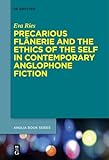Precarious Flânerie and the Ethics of the Self in Contemporary Anglophone Fiction / Eva Ries.
Material type: TextSeries: Buchreihe der Anglia / Anglia Book Series ; 76Publisher: Berlin ; Boston : De Gruyter, [2022]Copyright date: ©2022Description: 1 online resource (VIII, 298 p.)Content type:
TextSeries: Buchreihe der Anglia / Anglia Book Series ; 76Publisher: Berlin ; Boston : De Gruyter, [2022]Copyright date: ©2022Description: 1 online resource (VIII, 298 p.)Content type: - 9783110767476
- 9783110767520
- 9783110767490
- 823/.91409384 23/eng/20220728
- PR888.S82 R54 2022
- online - DeGruyter
- Issued also in print.
| Item type | Current library | Call number | URL | Status | Notes | Barcode | |
|---|---|---|---|---|---|---|---|
 eBook
eBook
|
Biblioteca "Angelicum" Pont. Univ. S.Tommaso d'Aquino Nuvola online | online - DeGruyter (Browse shelf(Opens below)) | Online access | Not for loan (Accesso limitato) | Accesso per gli utenti autorizzati / Access for authorized users | (dgr)9783110767490 |
Frontmatter -- Acknowledgments -- Contents -- 1 The Return of the Flâneur -- 2 Flânerie and its Discontents -- 3 Michel Foucault’s Ethics of the Self -- 4 Judith Butler’s Precarious Subjects -- 5 Synopsis: Ethical Subjects and the Flânerie Text -- 6 The End of Flânerie? The Sovereign Subject and Precarious City Life in Ian McEwan’s Saturday -- 7 Flânerie as Technique of the Self -- 8 City Matters: Affect and Media in Precarious Performances of Subjectivity -- 9 Conclusion -- Works Cited -- Index
restricted access online access with authorization star
http://purl.org/coar/access_right/c_16ec
Even though the literary trope of the flâneur has been proclaimed ‘dead’ on several occasions, it still proves particularly lively in contemporary Anglophone fiction. This study investigates how flânerie takes a belated ‘ethical turn’ in its more recent manifestations by negotiating models of ethical subjectivity. Drawing on Michel Foucault’s writings on the ‘aesthetics of existence’ as well as Judith Butler’s notion of precariousness as conditio humana, it establishes a link between post-sovereign models of subject formation and a paradoxical constellation of flânerie, which surfaces most prominently in the work of Walter Benjamin. By means of detailed readings of Ian McEwan’s Saturday, Siri Hustvedt’s The Blindfold, Teju Cole’s Open City, Dionne Brand’s What We All Long For and Robin Robertson’s The Long Take, Or a Way to Lose More Slowly, this book traces how the ambivalence of flânerie and its textual representation produces ethical norms while at the same time propagating the value of difference by means of disrupting societal norms of sameness. Precarious Flânerie and the Ethics of the Self in Contemporary Anglophone Fiction thus shows that the flânerie text becomes a medium of ethical critique in post-postmodern times.
Issued also in print.
Mode of access: Internet via World Wide Web.
In English.
Description based on online resource; title from PDF title page (publisher's Web site, viewed 25. Jun 2024)


